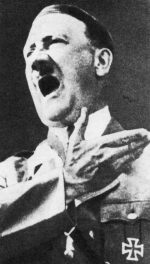Blind faith protected Hitler
All Our Yesterdays looks back at an attempt to rid the world of its most evil man

This week marks the 25th anniversary of the first attempt on Hitler’s life by the German underground movement — to be dramatically recalled in Monday’s All Our Yesterdays. The story of the German anti-Nazi resistance movement is told here
by TERENCE PRITTIE
Diplomatic Correspondent of The Guardian, 16 years a foreign correspondent in Germany, and author of the book “Germans against Hitler.”

IT was in November, 1939, that the first attempt was made on the life of Adolf Hitler.
A bomb exploded in the Buergerbraukeller, a beer-hail in Munich, where Hitler had just been addressing a rally of the “old comrades” of the Nazi Party.
Along with the Reichstag fire, this bomb-plot remains one of the two unsolved mysteries of the Nazi era.
A man called George Elser was later arrested by the Nazis and murdered by them in prison. Elser was a Communist, and he may have been the instrument of a Communist plot.
It is also possible that there was no genuine plot at all and that the explosion was engineered by the Nazis, and timed to take place after Hitler had left the beer-hall. The Nazis used the incident as a pretext to send armed men across the Dutch frontier at Venlo where they kidnapped two British secret service agents — Captains Best and Stevens.
The Buergerbraukeller incident is a reminder that active opposition to Hitler among the Germans did not begin with the July, 1944, conspiracy organised by Count Claus Schenk von Stauffenberg and his friends.
There was opposition to Hitler from the moment he seized power in 1933. But his opponents were at first not able to visualise resistance in terms of physical force or in terms of killing him.
This was because generations of Germans had eagerly embraced the teaching of Bismarck, that the citizen must serve the State unquestionably if the State is to be strong.
To almost all Germans in the first 40 years of this century, a strong Germany was their ideal. To them the assassination of the Head of the State was unthinkable.
Yet in March, 1933, the Social Democrats voted against the Enabling Act which gave Hitler the powers of a dictator. They refused to dissolve their party, and many of their members went into exile in order to fight Nazism.
Others distributed illegal pamphlets, organised cells in factories or crossed to and fro between Germany and the surrounding countries bringing information and money.
The Communist underground movement was also active and more than 250,000 Communists were sent to prison during the first six years of Nazi rule.
Individual members of the Roman Catholic and Evangelical churches did not hesitate to speak out against evil doings, even if this brought them into conflict with the authorities.
The youth of Germany could scarcely have been expected to oppose Nazism, for they grew up in the first flush of enthusiasm for the material achievements of the regime. They found themselves pitch-forked into a war which they believed had been forced on their country.
Yet there is the shining example of the White Rose group in Bavaria, whose members were distributing leaflets as early as 1942. Long before the lost battle of Stalingrad and the consequent anticipation of Germany’s defeat.
There are lots of other examples, too. of individuals who showed their loathing of Nazism and paid the penalty for it.
It was particularly difficult for German Conservatives to focus their minds on active resistance to Hitler. They were bound to Bismarck’s creed of service to the State.
Those of them who were soldiers were bound to the cause by a personal oath of loyally to the Fuehrer and were susceptible to zenophobia [sic] — “our country, right or wrong.” Even so, the German Conservatives, largely because they were men of action, were behind the serious attempts to kill Hitler.
In 1943 and early the following year, there were at least four such efforts. In three of them, the conspirators were quite prepared to blow themselves up together with Hitler. They were foiled only by last-minute changes in his plans.
In March, 1943, a bomb was smuggled into Hitler’s plane, shortly before he boarded it. He might have been blown to pieces in mid air, had not a tiny part of the mechanism failed.
The German Conservatives debated a coup against Hitler in 1938 and 1939. They planned to kill him in 1941 as the Nazi armies drove deep into Russia and the war looked like being won. To me, this is at least as significant as the final drama in July, 1944.
The truth is that there were many Germans who did their best to oppose Hitler — even though their numbers were small in comparison with the mass of their sheep-like fellow citizens.
Their story should not be forgotten, least of all by the Germans of the post war era. For the memory of their courage and independence of mind will do more than anything else to help Germany to grow up self-reliant and self-aware. defenders of human liberties and rights.




